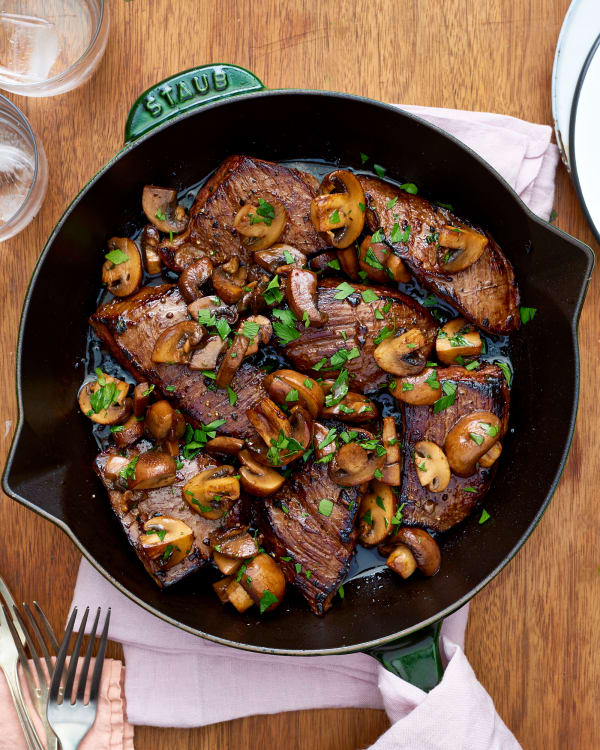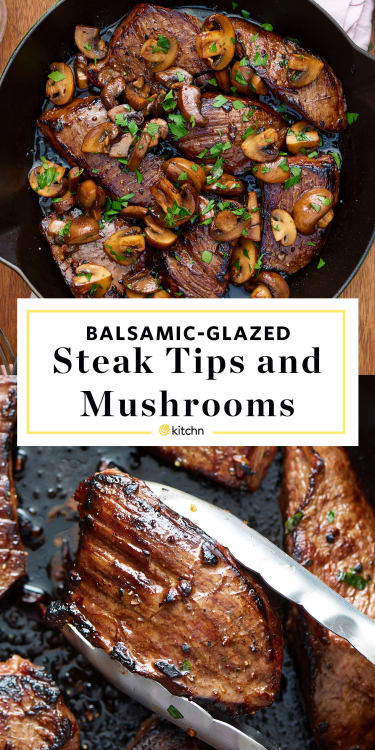Easy Balsamic Glazed Steak Tips and Mushrooms
Easy Balsamic Glazed Steak Tips and Mushrooms
When you usually sear meat, you don't want to crowd the pan so that the meat gets a chance to brown. With this recipe, however, crowding is a good thing. The marinade contains sugar, which contributes to browning but also can burn easily. Keeping the meat close together means that there's less opportunity for the marinade to drip off into the bottom of the pan and burn. And don't worry that the steak won't be flavorful because it doesn't brown as much — that's the job of the marinade.

(Image credit: Joe Lingeman)
Easy Balsamic Glazed Steak Tips and Mushrooms
Serves 4
When you usually sear meat, you don't want to crowd the pan so that the meat gets a chance to brown. With this recipe, however, crowding is a good thing. The marinade contains sugar, which contributes to browning but also can burn easily. Keeping the meat close together means that there's less opportunity for the marinade to drip off into the bottom of the pan and burn. And don't worry that the steak won't be flavorful because it doesn't brown as much — that's the job of the marinade.

(Image credit: Joe Lingeman)
Easy Balsamic Glazed Steak Tips and Mushrooms
Serves 4
Ingredients:
For the steak:

Directions:
Storage: Leftovers can be stored in an airtight container in the refrigerator for up to 3 days.
Marinade: The marinade can be made and stored in an airtight container in the refrigerator for up to 2 days. Rewhisk before using.
For the steak:
- 1 1/2 pounds sirloin steak tips, flap meat, or flank steak, cut into 3-inch pieces
- 1/4 cup tamari or soy sauce
- 2 tablespoons vegetable oil
- 2 tablespoons balsamic vinegar
- 1 tablespoon granulated sugar
- 2 cloves garlic, minced
- 1 teaspoon Dijon mustard
- 1/2 teaspoon kosher salt
- 1/4 teaspoon freshly ground black pepper
- 2 tablespoons vegetable oil
- 1 pound cremini mushrooms, halved or quartered if large
- 2 tablespoons balsamic vinegar
- 2 tablespoons unsalted butter
- Coarsely chopped fresh parsley leaves, for garnish (optional)

Directions:
- Marinate the steak: Place the steak in a single layer in a 9x13-inch baking dish or in a resealable gallon plastic bag; set aside. Whisk the remaining ingredients in a small bowl until the sugar is dissolved. Pour over the steak and turn the steak to coat. Cover the baking dish or seal the bag, and refrigerate at least 1 hour or up to 4 hours.
- Cook the steak and mushrooms: Heat the oil in a large frying pan over medium-high heat until shimmering. While the oil is heating, remove the steak from the marinade and pat dry with paper towels. Add the steak pieces to the pan (it's okay to crowd the pan as long as they're in a single layer) and sear until browned and the thickest piece registers 120°F to 125°F for medium-rare steak, 3 to 4 minutes on each side. (Or cook to 130°F to 135°F for medium steak, and 140°F to 145°F for medium-well steak — add a minute or two for every 10 degrees needed.) Transfer to a serving platter and set aside in a warm place or cover loosely with aluminum foil.
- Add the mushrooms to the pan and cook, stirring occasionally and adjusting the heat if needed, until tender, about 5 minutes — they will release a lot of liquid. Add the vinegar and simmer 1 minute. Remove from the heat, add the butter, and stir until melted and the sauce in the pan is glossy. Taste and season with salt and pepper as needed. Pour over the steak, top with the parsley if desired, and serve.
Storage: Leftovers can be stored in an airtight container in the refrigerator for up to 3 days.
Marinade: The marinade can be made and stored in an airtight container in the refrigerator for up to 2 days. Rewhisk before using.
full recipe:
BERITA LENGKAP DI HALAMAN BERIKUTNYA
Halaman Berikutnya


